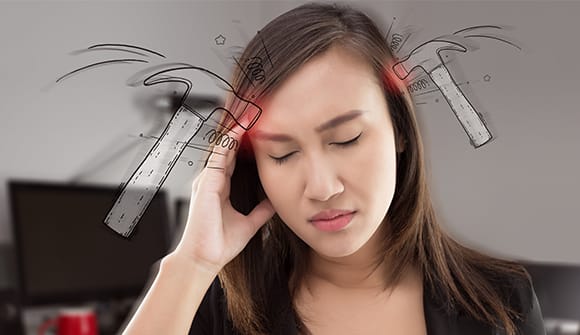Brain pain
Triggers and treatments for headaches.
Article Author: Guest Columnist
Article Date:

Pouya Shooliz, MD, is a board-certified neurologist with Baptist Neurology Group, located at Baptist Medical Center Beaches. Headache and migraine treatments are among his many specialties.
Nearly everyone has an occasional headache. But if you suffer from them constantly and struggle to find relief, you may have a headache disorder.
Interestingly, the brain doesn’t feel pain. However, a thin membrane called the meninges surrounds the brain and has many pain receptors. This is where the discomfort usually begins. There are also a few critical nerves around the head that can prompt headaches.
Common headache triggers to watch for
If you suffer from headaches, it's important to see if there's a common factor before they begin. Potential triggers include:
- Alcohol
- Certain foods
- Heat
- Hormones
- Light
- Odors
- Skipping meals
- Sleep disturbances
- Sleeping late
- Smoke
- Weather
Types of headaches and treatment options
There are many types of headaches, each with different causes and treatments. Chronic ones occur frequently, usually 15 days or more per month.
Migraines, which are intense headaches, cause severe pain, throbbing, pounding or pulsating, usually on one side of the head. They may lead to visual disturbances and often cause nausea, vomiting and sensitivity to light and sound. Migraines can last anywhere from four hours to two days.
Tension headaches are constant and aching, lasting anywhere from a few minutes to a few hours. Other types can have a sharp or stabbing quality, electric-type pain, or may radiate from one place to another.
Some people get relief from non-medical treatments, such as staying in a dark and quiet room, using an ice pack or warm compress, or drinking coffee, tea or other caffeinated drinks (in moderation). Low-impact exercise is also a good option to prevent migraines.
Some individuals will benefit from daily medications to prevent headaches, while others may only need to take something if they feel a headache starting. Additional treatment options include nasal sprays and home injection kits.
While some headaches can be resolved with home care measures and nonprescription medications, if you suffer from chronic headaches, it’s important to work with your doctor to come up with a treatment plan to relieve your pain or stop the headache before it starts.
When to see a doctor for headaches
A headache that is extreme and severe always needs to be checked out immediately in the Emergency Room. Sometimes, aneurysms (bulging blood vessels in the brain), strokes or other issues may cause brain bleeding, leading to sudden, severe and intense pain.
A headache associated with other sudden changes, like loss of consciousness, weakness, numbness or changes in speech or vision, could be life-threatening. Anyone experiencing these symptoms should call 911 immediately; every minute counts.
For chronic headaches, it’s time to see your doctor if:
- Non-medical treatments don’t help.
- You have a new type of headache that you haven’t had before.
- You have a headache that’s different in severity or location.
It may help to keep a diary to identify what triggers your headaches and bring it with you to your doctor’s appointment. That way, you can begin to see patterns and know what to avoid. Your doctor can help determine the type of headache you're experiencing and develop a treatment plan for you.
Are you suffering from chronic headaches or migraines?
Medical specialists with Baptist Neurology Group are highly qualified to help diagnose and treat headache pain. Talk to your primary care physician to see if a referral to a neurologist would be beneficial. To find the right provider for you, call 904.202.4YOU (4968) or fill out the appointment request form.



